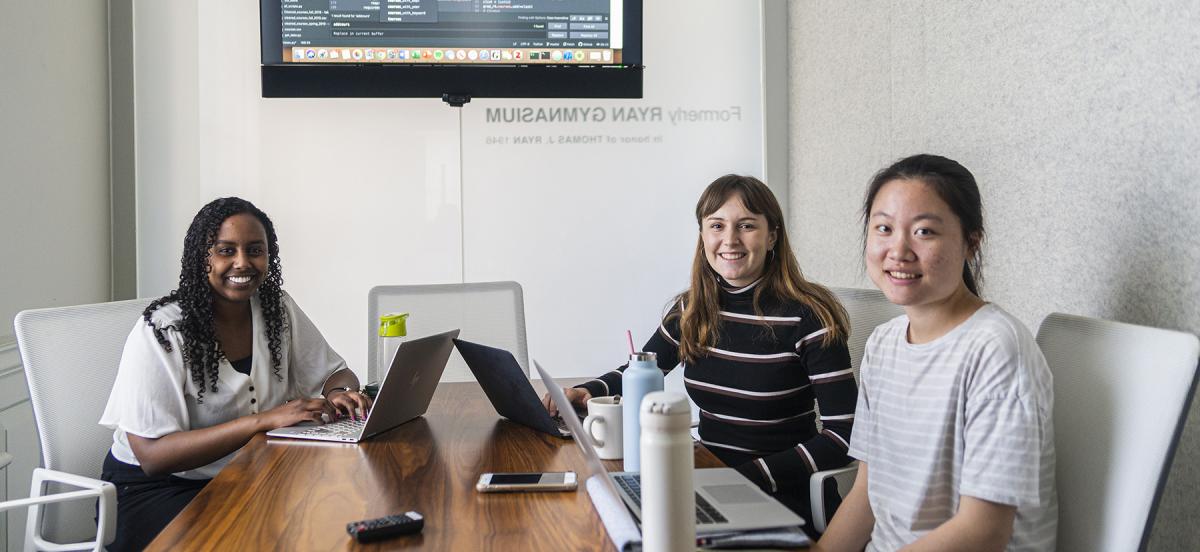Gradual Makes Rapid Progress in the Innovation Incubator

For the 2019 Summer Innovation Incubator (from left) Blien Habtu '21, Isabella Muno '21, and Ziyao Wang '22 developed Gradual, a flexible and dynamic course mapping tool that helps students visualize their academic path to graduation. Photo by Patrick Montero.
Details
Sponsored by the Haverford Innovations Program’s Summer Innovation Incubator, the three-member team spent their summer developing a digital interface that tracks students’ academic trajectories and the courses they need to graduate.
At the start of the summer, three Haverford students confronted a problem—when enrolling in classes, they were unable to track the progress they’d made towards their graduation requirements. Eight weeks later they have a working MVP (minimally viable product) and a business plan to put their solution into action. As members of this year’s Haverford Innovations Program (HIP) Summer Incubator, Isabella Muno ’21, Ziyao Wang ’22, and Blien Habtu ’21 have created Gradual, a website that maps and tracks students’ academic progress towards graduation.
Gradual is one of two projects (the other being Open House, a collaborative design system that employs accessible Maker Space fabrication technologies to produce sustainable building modules) in HIP’s Incubator in its second year, following its launch as an arm of the new VCAM building, dedicated to supporting creativity and ingenuity in entrepreneurial enterprises.
“The impetus for the HIP program and the incubator originated with Haverford faculty and administration who saw a need to support the creative and entrepreneurial energies existing within the Haverford community,” said Shayna Nickel, the HIP’s manager.
The Incubator has proved to be an incredibly fecund environment for the Gradual team, offering them an enlivening mix of independence and guidance as they built their site from the ground up.
“With Gradual, students can plan courses and co-curriculars across their undergraduate career and track their progress through an analytics dashboard,” said Muno, a computer science major. “At the same time, institutions [like the College] can use data [Gradual gathers] about decisions to better understand why students make the decisions they make.”
The trio’s exploration of digital entrepreneurship began at this year’s annual Tri-College Hackathon, where they planted the seeds for Gradual while also taking home - one of the top prizes at the event. When they arrived on campus for the Incubator, they were quickly thrust into a rigorous process that helped them grow and test the concept as a viable business.
“As soon as we began our time in the Incubator, we were introduced to the Agile and Scrum development process,” said Wang of the development methodologies that Nickel has oriented the Incubator program around.“This meant structuring our project in two week sprints.”
Each sprint saw the team outlining short-term goals that they wanted to achieve in the next two weeks. This process, supplemented by daily meetings and reassments, allowed for dynamic progress as the three adapted to whatever problems might arise.
“This process allowed our responsibilities to be flexible as we made runtime decisions about where to direct our attention,” said Habtu.
The Innovation Incubator also paired the students with various figures from the Haverford community—staff, faculty, and alumni—who offered practical skills and advice to the young entrepreneurs accrued over years of experience in their respective fields. Nickel matched the Gradual team with alumni who could help guide them toward production of a “minimally viable product,” including mentor Casey Falk ‘17 and advisor Sarah Gray ‘03, and facilitated several workshops—also often led by alums— that covered different aspects of business fundamentals, working through team conflicts, and developing a product.
“As a space for creativity, VCAM provided a synergistic environment this summer, not only as a physical place, but also by leveraging the expertise from different centers and staff housed within the building,” Nickel said.
After a summer of hard work and a few sprinkles of VCAM magic, Gradual had a working web application -. Not only did the team complete their initial mission, undertaking user testing and demos early in July, they also expanded it, adding more functions than initially outlined.
“When we first started brainstorming, our MVP... was to create a website that could map out requirements for three majors,” said Wang. “We have currently surpassed this goal and are scaled to seven majors that are offered at Haverford.”
With plans for Gradual to encompass each major in the Bi-Co, the trio has a lot of work still ahead of them as the Incubator comes to a close, but they are motivated to make their product useful to all members of the Haverford community. They’re preparing to build in an operation that tracks why students make academic decisions, such as changing a major. This data, when collected -, promises to be incredibly useful to both college administrations and future students who may deliberate over the same choices.
“We have next steps that we are hoping to work on,” said Habtu. “We want to further develop Gradual, including the addition of predictive features and enhanced data collection about why students make the decisions they make.”
Going into the fall, the three team members are excited to develop their product further. As they look forwards towards a more business-oriented approach focused on presenting Gradual to potential clients, they’re also more than satisfied with what they’ve accomplished up to this point.
“It has been gratifying to reflect on our progress and look at our progress from wireframes to increasing website functionality,” said Muno. “This, and our team, has been what I enjoyed most about the project so far and what I look forward to in the future.”
“Summer Centered” is a series exploring our students’ Center-funded summer work.



